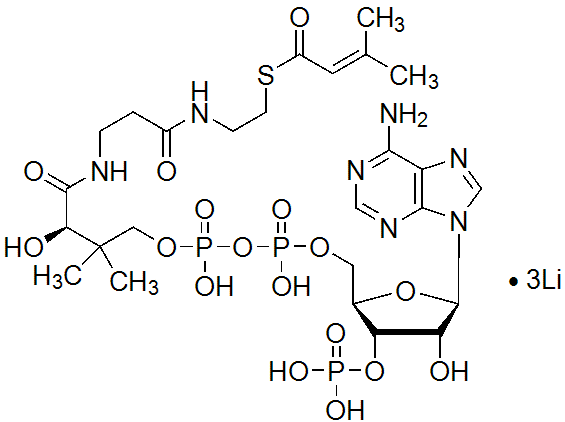b-Methylcrotonyl coenzyme A lithium salt is widely utilized in research focused on:
- Metabolic Studies: This compound plays a crucial role in studying metabolic pathways, particularly in the context of fatty acid metabolism and energy production. Researchers can track its effects on cellular respiration and energy yield.
- Biochemical Assays: It is used in various biochemical assays to evaluate enzyme activity related to acyl-CoA metabolism. This application is essential for understanding enzyme kinetics and regulation in metabolic disorders.
- Pharmaceutical Development: The compound is explored in drug development, particularly for conditions related to metabolic syndromes. Its role in modulating metabolic pathways can lead to innovative therapeutic strategies.
- Nutrition Research: In nutritional studies, it helps in understanding how different diets affect metabolic processes. This can lead to better dietary recommendations for managing health conditions.
- Biotechnology Applications: It is utilized in biotechnological applications, such as biofuel production, where understanding lipid metabolism is crucial for optimizing microbial strains for higher yield.
General Information
Properties
Safety and Regulations
Applications
b-Methylcrotonyl coenzyme A lithium salt is widely utilized in research focused on:
- Metabolic Studies: This compound plays a crucial role in studying metabolic pathways, particularly in the context of fatty acid metabolism and energy production. Researchers can track its effects on cellular respiration and energy yield.
- Biochemical Assays: It is used in various biochemical assays to evaluate enzyme activity related to acyl-CoA metabolism. This application is essential for understanding enzyme kinetics and regulation in metabolic disorders.
- Pharmaceutical Development: The compound is explored in drug development, particularly for conditions related to metabolic syndromes. Its role in modulating metabolic pathways can lead to innovative therapeutic strategies.
- Nutrition Research: In nutritional studies, it helps in understanding how different diets affect metabolic processes. This can lead to better dietary recommendations for managing health conditions.
- Biotechnology Applications: It is utilized in biotechnological applications, such as biofuel production, where understanding lipid metabolism is crucial for optimizing microbial strains for higher yield.
Documents
Safety Data Sheets (SDS)
The SDS provides comprehensive safety information on handling, storage, and disposal of the product.
Product Specification (PS)
The PS provides a comprehensive breakdown of the product’s properties, including chemical composition, physical state, purity, and storage requirements. It also details acceptable quality ranges and the product's intended applications.
Certificates of Analysis (COA)
Search for Certificates of Analysis (COA) by entering the products Lot Number. Lot and Batch Numbers can be found on a product’s label following the words ‘Lot’ or ‘Batch’.
*Catalog Number
*Lot Number
Certificates Of Origin (COO)
This COO confirms the country where the product was manufactured, and also details the materials and components used in it and whether it is derived from natural, synthetic, or other specific sources. This certificate may be required for customs, trade, and regulatory compliance.
*Catalog Number
*Lot Number
Safety Data Sheets (SDS)
The SDS provides comprehensive safety information on handling, storage, and disposal of the product.
DownloadProduct Specification (PS)
The PS provides a comprehensive breakdown of the product’s properties, including chemical composition, physical state, purity, and storage requirements. It also details acceptable quality ranges and the product's intended applications.
DownloadCertificates of Analysis (COA)
Search for Certificates of Analysis (COA) by entering the products Lot Number. Lot and Batch Numbers can be found on a product’s label following the words ‘Lot’ or ‘Batch’.
*Catalog Number
*Lot Number
Certificates Of Origin (COO)
This COO confirms the country where the product was manufactured, and also details the materials and components used in it and whether it is derived from natural, synthetic, or other specific sources. This certificate may be required for customs, trade, and regulatory compliance.


